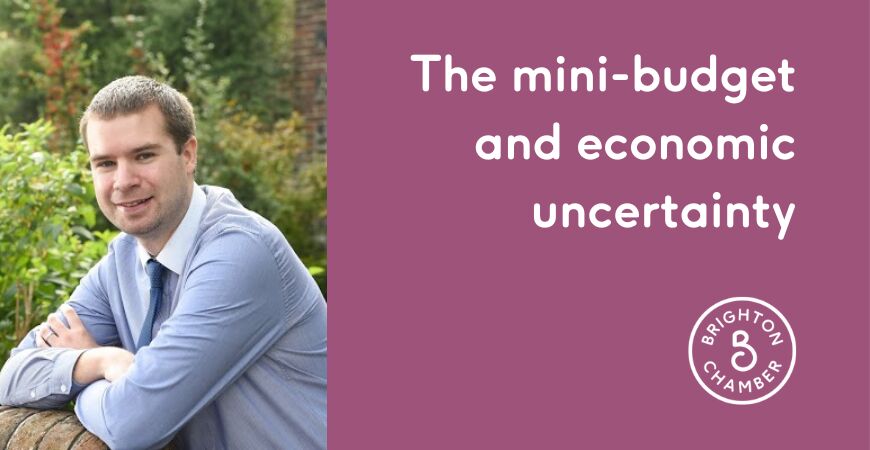

Wed 19 / 10 / 22
The mini-budget and economic uncertainty - Q&A with accountant Mark Horsfield
Mark Horsfield, Business Services Manager at Plus Accounting reflects on the key questions his clients are asking him in the wake of the mini-budget, mini-budget reversal, and associated economic instability.
By Mark Horsfield of Plus Accounting, Chartered Accountants
Will I have enough resources to cope with the rising costs?
Many individuals and businesses are facing uncertain times this winter, with the biggest worry being the cost-of-living crisis. Whether you work from home or use an office, it is likely you’ll have experienced increased fuel, gas and electric costs. The government recently announced energy support within this area, with a price guarantee for households, and a relief scheme for businesses, fixing the price of energy to the end of March 2023. With inflation reaching historic high levels, whether you have a business premises or not, sell goods or provide services, there seems to be no escape from the rises. So more than ever, you need to plan ahead, and keep track of your finances.
It will be worth preparing detailed budget information on a weekly or monthly basis, and compare actual results against budgeted figures, analysing times where you’ve gone over budget, whether it was as result of unexpected, one-off expenditure or if future weeks/months should be adjusted for a higher cost which will be recurring. Having your budget in place will help you identify times when your cash levels may be expected to be a bit tight, you can then be as prepared as possible.
Reviewing your financial data can help you identify what your fixed and variable costs are, which are essential costs for your trade and those which you can potentially look to reduce if your income no longer supports the cost. If you have employees and use a business premise, try and promote energy saving measures amongst your staff, and keep them involved in the effort to reduce overheads.
What financial support is available for my business?
Many businesses took out bounce back loans during the COVID lockdown period, and likely now find themselves with their repayment schedule commencing. If you haven’t already done so, and need to help with cashflow, you can ask your loan provider for information on extending the term period of your loan to 10 years; this will reduce the monthly repayment amount. The downside of doing this that it will result in additional interest costs over the life of the loan. It may also be worth checking with your provider if you can use payment holidays if you find yourself in severe financial difficulties.
If you have outstanding tax liabilities which you are struggling to pay, HMRC do offer help to pay arrangements, and from speaking with clients who have approached HMRC regarding payment issues, they have found HMRC very receptive in creating an affordable payment plan. Often you won’t be charged late payment penalties if you have a payment plan in place. So if you do have concerns about paying any tax bills you have, especially as we approach the self-assessment tax deadline on 31st January, do get in contact with HMRC as early as possible. This link provides helpful information on arranging this.
HMRC currently has a database of available grant and financial support schemes, many of those currently listed are based on geographical location, so if there is currently no scheme available to you, it is worth keeping a bookmark of this page and referring back to it from time to time in case anything pops up which may be relevant for you. You can find the link here.
What does the government's mini-budget mean for me?
Admittedly I’ve had to rewrite the answer to this question 2 or 3 times, with government making U-turns on their policies faster than I can type! So, this question really becomes more about ‘what I will now no longer be getting, in terms of tax reductions?’.
The Corporation Tax rise will revert to its original plan, profits up to £50,000 will be taxed at 19%, profits over £250,000 taxed at 25%, and profit levels in between these two ranges will be subject to tax at the marginal rate, which actually works out as an effective rate of 26.5% on profits over £50,000, so actually not a great place to be in if your business falls within this. If this does apply to you, it is worth looking into ideas of how to reduce your taxable profit, either by investing in Plant & Machinery or other equipment for your business, looking into acquiring a new electric company car, which still has very low benefit in kind rates, or potentially make pension contributions into your personal pension plan, paid directly from your Ltd company.
The planned 1% cut in income tax has been scraped, so the basic rate income tax rate will remain at 20% indefinitely. IR35 reforms will also not take place, disappointing many contractors across the country.
There still remains support for your energy bills, however the price guarantee will now only be in place until April 2023, rather than 2 years, where it will then be subject to review, but any further support is likely to be a targeted approach rather than a blanket everyone receiving it.
The reversal of the 1.25% National Insurance increase is going ahead as planned, as are the changes in stamp duty, with no stamp duty payable on the first £250,000 of the property’s value, with first time buyers getting up to £425,000 with nil duties payable, which will be welcome news for those in the process of buying a home, just hopefully you were able to lock in your interest rate on your mortgage deal before the rates rose, and various mortgage products were withdrawn!
Thank you to Mark Horsfield, Business Services Manager at Plus Accounting, for writing this guest blog.
If you want to contribute to the Chamber blog, contact us on hannah@brightonchamber.co.uk



